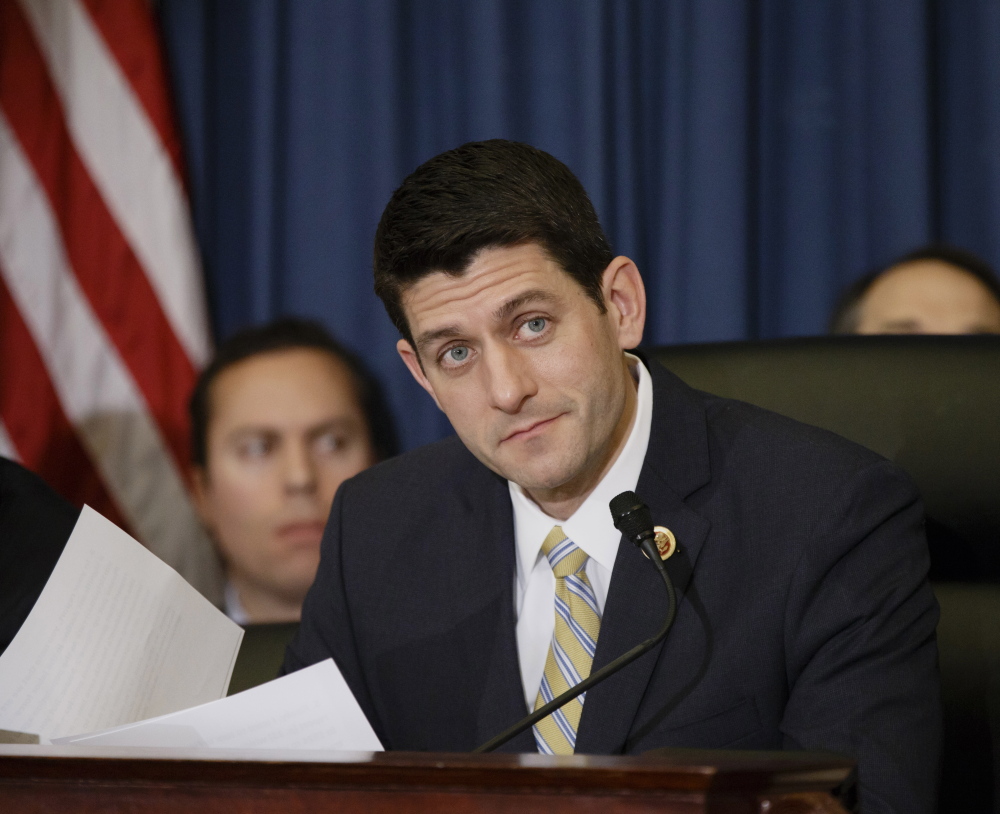WASHINGTON — House Budget Committee Chairman Paul Ryan unveiled an updated Republican budget plan Tuesday that would slash $5.1 trillion in federal spending over the coming decade and promises to balance the government’s books with wide-ranging cuts in programs like food stamps and government-paid health care for the poor and working class.
Ryan’s plan would also cut Pell Grants for low-income students and pensions for federal workers. The proposal would reprise a voucher-like Medicare program for future retirees that would be the basis for GOP claims that the measure would drive down government debt over the long term. It also relies on score-keeping help from the Congressional Budget Office, reflecting the beneficial effects of deficit cuts on long-term economic growth and tax revenues.
The plan should skate through the Budget Committee on Wednesday but faces challenges on the floor next week since it endorses a bipartisan pact — negotiated by Ryan, R-Wis., and Senate Budget Committee Chairwoman Patty Murray, D-Wash., in December — to increase agency operating budgets this year and next.
Many conservatives who opposed the pact last year would have to reverse course and embrace them as part of the GOP budget. Democrats who helped pass the Ryan-Murray pact in December will oppose the GOP plan.
The legislation promises to serve more as a political and policy statement by House Republicans than a realistic attempt to engage President Barack Obama and Democrats, who control the Senate, in any serious effort to further cut the deficit. Election-year politics are in play, for starters, as are entrenched differences over spending and taxes. Senate Democrats have already announced they will not advance a budget this year, but Ryan pitched his budget as a party-defining document on where Republicans would take the nation if they return to power.
“It is not just enough for us to be an opposition party,” Ryan said. “We need to be a proposition party. … And we need to show the country the right way forward to get this economy growing, to get our budget, our fiscal house in order.”
At issue is the arcane congressional budget process, which employs a non-binding measure known as a budget resolution to set forth goals for future taxes, spending and deficits. But follow-up legislation is usually limited to one-year appropriations bills rather than more difficult measures to deal with the government’s long-term fiscal challenges, which are fueled by spiraling health care costs and the retirement of the baby boom generation.
Ryan’s budget brings back a now-familiar list of spending cuts to promise balance, including $2.1 trillion over 10 years in health care subsidies and coverage under the Affordable Care Act, $732 billion in cuts to Medicaid and other health care programs, and almost $1 trillion in cuts to other benefit programs like food stamps, Pell Grants and farm subsidies. While repealing the benefits of “Obamacare,” Ryan would preserve its tax increases and cuts to providers, including cuts to private insurers under the Medicare Advantage program. Republicans have attacked Democrats for the Medicare cuts used to finance the new health care law.
The measure also promises deep, probably unrealistic cuts to domestic programs like education, health research and grants to local governments that are funded each year through annual appropriations bills.
As in the past, Ryan has steered clear of cuts to Social Security, and he promises steady increases for veterans and restoration of looming defense cuts. But he faced a more challenging task to promise to balance the budget by decade’s end than he did last year because the CBO projects lagging revenue estimates.
Steep cuts to Medicaid, which Ryan proposes to turn into a block grant program managed by the states, could drive millions of people from the program, including seniors in nursing homes and children from low-income households. Ryan proposes to cut projected costs of Medicaid by 17 percent over the decade. It also contains sharp, unexplained cuts to a category including refundable income and child tax credits for the working poor and Supplemental Security Income for the elderly, disable and very poor.
“This dog-eat-dog budget is nothing short of an assault on Americans struggling to stay afloat economically,” said Rep. Chris Van Hollen, D-Md.
Send questions/comments to the editors.



Success. Please wait for the page to reload. If the page does not reload within 5 seconds, please refresh the page.
Enter your email and password to access comments.
Hi, to comment on stories you must . This profile is in addition to your subscription and website login.
Already have a commenting profile? .
Invalid username/password.
Please check your email to confirm and complete your registration.
Only subscribers are eligible to post comments. Please subscribe or login first for digital access. Here’s why.
Use the form below to reset your password. When you've submitted your account email, we will send an email with a reset code.